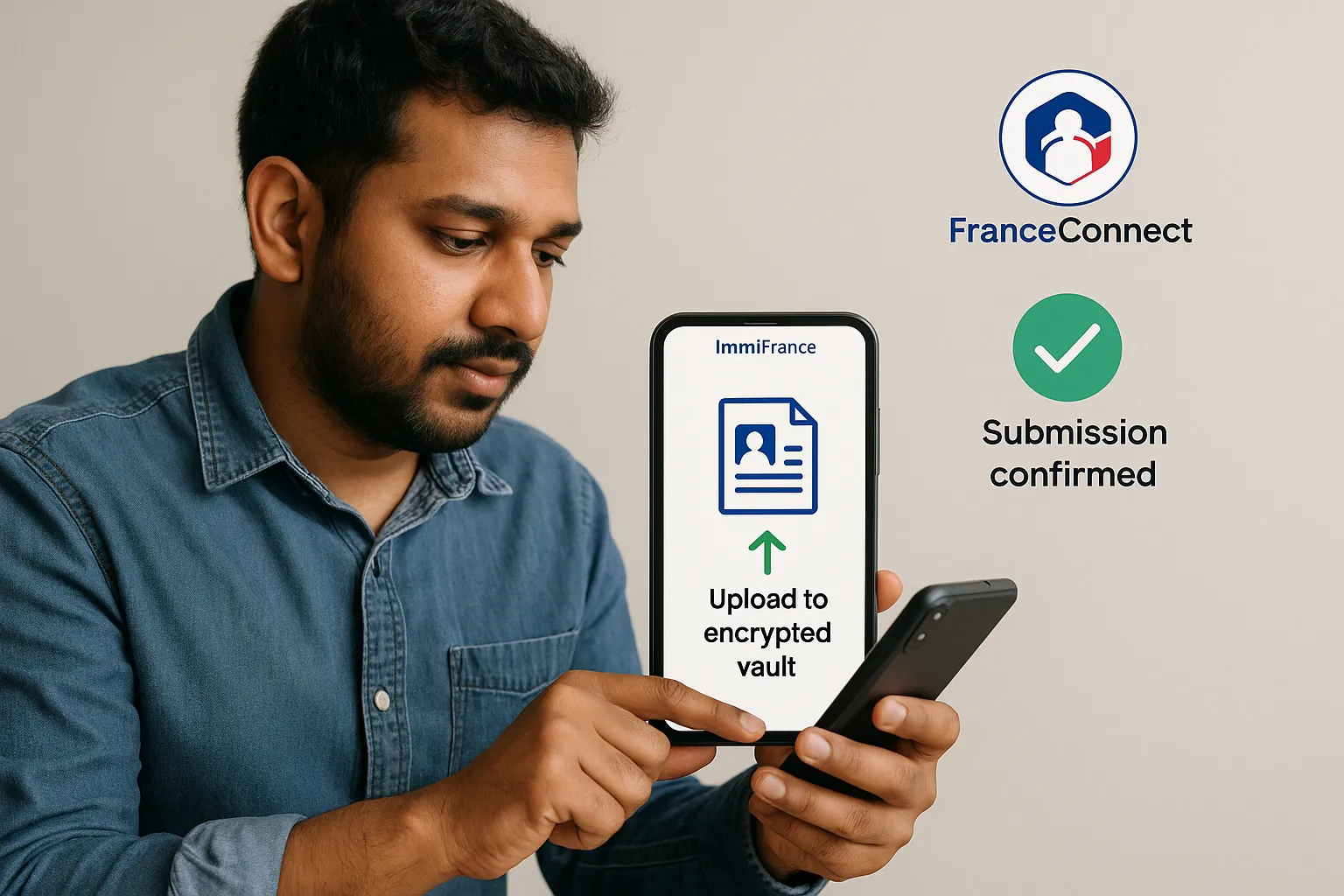Data Privacy on the ANEF Portal: Keeping Your Personal Information Safe

Digitalising immigration paperwork through France’s Administration Numérique pour les Étrangers en France (ANEF) portal has spared thousands of migrants the long lines at local préfectures. Yet uploading passports, birth certificates and even biometric data online raises a legitimate question: who exactly sees my information and how is it protected?
In this guide we unpack the legal safeguards behind the platform, the real-world risks to watch for, and simple actions you can take today to keep your personal data safe while filing residence permits, visa applications or naturalisation requests.
1. What information does the ANEF portal collect?
When you create an ANEF account (currently reachable only via FranceConnect or FranceConnect+), the system stores data in three main government databases:
| Category | Typical examples uploaded by users | Main database |
|---|---|---|
| Identity data | Passport biodata page, national ID card, civil-status certificates | AGDREF 2 (Gestion des étrangers) |
| Biometric data | Facial image, fingerprints (captured later at prefecture or consulate) | VISABIO |
| Supporting evidence | Payslips, tax notices, CPAM attestation, tenancy contracts, diplomas, photos | ANEF document repository |
The information is linked to your numéro étranger and dossier number so agents in multiple prefectures can access it securely.
2. The legal framework that protects your file
- GDPR (EU Regulation 2016/679). As a resident of France your immigration data enjoys the same fundamental protections as any EU citizen’s data. The Ministry of the Interior acts as data controller; you are the data subject.
- French Data-Protection Act (Loi n°78-17). Articles 107 to 118 detail additional safeguards for “files containing personal data related to public security or immigration”.
- Decree n°2021-1521 of 25 November 2021. Officially created the digital ANEF procedure and set storage limits and authorised personnel categories.
- CNIL oversight. France’s data-protection authority issued Opinion n°2021-107 before the decree was adopted and can investigate any misuse or breach.
How long is the data kept?
| Type of file | Retention period (counted from last administrative decision) | Legal source |
|---|---|---|
| Residence-permit applications (AGDREF) | 30 years | CESEDA L311-5 and Decree 2021-1521 |
| Visa files (VISABIO) | 5 years | Code of Entry and Stay art. L611-6 |
| Naturalisation files | 15 years if approved, 10 years if refused | Ministry of Interior Circular NOR INTK0920011C |
After the retention period your data is automatically archived for statistical use or deleted.
3. Government security measures you rarely see
According to the Ministry’s 2024 security report, ANEF servers are hosted in a restricted government network, with:
- AES-256 encryption at rest and TLS 1.3 in transit
- Daily off-site backups within the European Union
- Role-based access for prefecture staff (two-factor login via Pro-Connect)
- Quarterly penetration tests supervised by the Agence Nationale de la Sécurité des Systèmes d’Information (ANSSI)
No system is immune to attacks, but France has not reported any large-scale breach of AGDREF or ANEF since the portal’s launch in 2022.

4. Real-world risks you can control
Most data leaks occur outside the government perimeter. Here are common weak points and how to fix them:
- Phishing emails pretending to be the prefecture. Always check the domain (gouv.fr) and never click payment links; ANEF fees are paid via the official timbre.impots.gouv.fr site only.
- Shared or public computers in cybercafés. Log in only on devices you control. If you must use a public PC, prefer a private browser window and clear cookies before logging out.
- Weak FranceConnect passwords. Upgrade to FranceConnect+ (La Poste Identité Numérique) that enforces strong passwords and a mobile confirmation.
- File metadata. PDFs often contain hidden data (author, GPS location of scans). Use a free metadata scrubber before uploading.
5. Eight best practices for a privacy-friendly application
- Create a dedicated email address purely for French administrative procedures.
- Activate two-factor authentication on that mailbox and on FranceConnect+.
- Name your files generically (2025-03-payslip.pdf) instead of Karim_Jones_Salary_EuroTravelCorp.pdf.
- Combine multi-page documents into one PDF (under 5 MB) to reduce upload points.
- Blur children’s photos unless identity proof is expressly required.
- Keep an encrypted local copy of every file on a password-protected external drive.
- Delete local temp scans immediately after confirmation of upload.
- Use a VPN if filing from unsecured Wi-Fi (café, hostel).
6. Exercising your GDPR rights
Under Articles 15 to 18 GDPR you can request access, rectification, erasure or restriction of processing. The quickest route is:
- Write to the Ministry of the Interior, Directorate for Immigration (DLPAJ) with a copy of your ID and numéro étranger.
- If no reply within one month or you disagree with the answer, lodge a complaint on CNIL’s portal (www.cnil.fr).
- For simple typos (misspelled name, wrong address) you can also use the “Signaler une erreur” button inside your ANEF dashboard.
Template sentence (French) to insert in your request:
Je sollicite, sur le fondement de l’article 15 du Règlement (UE) 2016/679, la communication des données à caractère personnel me concernant figurant dans les traitements AGDREF et ANEF.
7. What happens if there is a data breach?
- The Ministry must notify CNIL within 72 hours and inform affected users “without undue delay”.
- You may receive guidance to change passwords and monitor credit activity.
- If negligence can be proven, compensation is possible under Article 82 GDPR. Recent European immigration-data cases have seen awards between €500 and €2 000.
8. How ImmiFrance helps protect your documents
While ANEF is secure, many clients worry about the journey their files take before they reach the portal. ImmiFrance therefore offers:
- Encrypted document vault: upload via our SSL platform, stored on French ISO-27001 servers.
- Prefecture-ready PDFs: we merge and compress scans to meet ANEF size limits, removing hidden metadata in the process.
- Remote FranceConnect+ onboarding: guided identification session in English or Arabic.
- Real-time filing tracker: follow when each document is submitted and see who accesses it on our side.
By handing us a single secure upload, you avoid multiple email chains and inadvertent leaks.

Frequently Asked Questions
Is ANEF mandatory for all residence-permit renewals in 2025? Yes, since 1 January 2025 prefectures no longer accept paper renewals except for limited humanitarian cases.
Can I delete my ANEF account after I obtain French nationality? Your portal account can be closed, but historical data in AGDREF is retained for 15 years per decree rules.
Does the ANEF portal share my data with tax or police authorities? Police and border services can query AGDREF for identity verification. Tax authorities cannot access your uploads without a separate legal request.
Can I use someone else’s FranceConnect account to file? No. Filing under another identity is punishable by a €3 750 fine (CESEDA R114-8) and can trigger an OQTF.
Ready to file without risking your privacy?
Book a free 15-minute call with an ImmiFrance adviser to learn how our encrypted vault, GDPR-compliant workflow and lawyer network can turn a paperwork headache into a secure, successful application. Secure your slot today → https://immifrance.com/contact
